from the oh-calm-down-john dept
Every New Year’s Eve, the Chief Justice releases his year-end report, which used to include things like what the court would like to see Congress do. However, Justice Roberts now uses it more as a way to blog post whatever is on his mind. His latest is particularly tone-deaf, which is impressive, given how John Roberts is somewhat infamous for his tone-deafness. In particular, he has long made it clear that he has no idea how the public views the judicial system and its crumbled legitimacy under his own watch.
This year’s report waxes rhapsodically about the independent judiciary, while troublingly conflating threats against judges with valid criticism and concerns over the appearance of bias.
Roberts initially attempts to draw a line between legitimate criticism and threats:
Of course, the courts are no more infallible than any other branch. In hindsight, some judicial decisions were wrong, sometimes egregiously wrong. And it was right of critics to say so. In a democracy—especially in one like ours, with robust First Amendment protections—criticism comes with the territory. It can be healthy. As Chief Justice Rehnquist wrote, “[a] natural consequence of life tenure should be the ability to benefit from informed criticism from legislators, the bar, academy, and the public.”
If he had stopped there, or actually focused on legitimate threats, then this might not be such a big deal. But instead, he goes on to blur the lines between people expressing themselves in a First Amendment-protected manner and those threats:
Today, in the computer era, intimidation can take different forms. Disappointed litigants rage at judicial decisions on the Internet, urging readers to send a message to the judge. They falsely claim that the judge had it in for them because of the judge’s race, gender, or ethnicity—or the political party of the President who appointed the judge. Some of these messages promote violence—for example, setting fire to or blowing up the courthouse where the target works.
Occasionally, court critics deploy “doxing”—the practice of releasing otherwise private information such as addresses and phone numbers—which can lead to a flood of angry, profane phone calls to the judge’s office or home. Doxing also can prompt visits to the judge’s home, whether by a group of protestors or, worse, an unstable individual carrying a cache of weapons. Both types of activity have occurred in recent years in the vicinity of the Nation’s capital. Activist groups intent on harassing judges have gone so far as to offer financial incentives for posting the location of certain judicial officers.
Notice the sleight of hand here. He starts out complaining about “disappointed litigants” who “rage at judicial decisions on the Internet,” but then immediately leaps from there to doxing. He could call out the limited number of actual threats, but he elides the differences here and suggests that any angry litigant speech leads inevitably to threats of violence. Roberts fails to clearly distinguish between protected speech criticizing judges and unacceptable doxing and threats. And he hopes you won’t notice.
Even if it was true that criticism frequently leads to true threats (and I find that unlikely), his own court, while he’s been the Chief Justice, has made it clear that to fall out of First Amendment protection, speech must include a true threat, not vague statements that get people riled up.
Indeed, the most galling part here is that when others rile people up on the internet, the Court suggests that nothing can be done. It’s only the judicial branch that apparently must be protected from angry screeds on the internet that might lead to more.
Consider, of course, that the Court in the last year bent over backwards to protect Donald Trump from criminal cases, including minimizing the impact of his own online and offline speech that helped rile up a bunch of people to literally invade the Capitol. Roberts’ own ruling in that case suggested near total immunity for Trump from such things.
Yet, some rando online is apparently a huge problematic threat because he lashes out on social media about a judge? Come on now.
Even worse, Roberts jumps blithely from claims of “doxing” and showing up at judges’ houses to things that are quite clearly First Amendment protected speech, such as claiming political bias in a judicial opinion:
Public officials, too, regrettably have engaged in recent attempts to intimidate judges—for example, suggesting political bias in the judge’s adverse rulings without a credible basis for such allegations. Within the past year we also have seen the need for state and federal bar associations to come to the defense of a federal district judge whose decisions in a high-profile case prompted an elected official to call for her impeachment. Attempts to intimidate judges for their rulings in cases are inappropriate and should be vigorously opposed. Public officials certainly have a right to criticize the work of the judiciary, but they should be mindful that intemperance in their statements when it comes to judges may prompt dangerous reactions by others.
Except if you’re the President*. Then your statements are just fine if they “prompt dangerous reactions by others.”
* Republican Presidents only.
From there, he goes even deeper into clearly First Amendment-protected speech:
Disinformation, even if disconnected from any direct attempt to intimidate, also threatens judicial independence. This can take several forms. At its most basic level, distortion of the factual or legal basis for a ruling can undermine confidence in the court system
Yeah, suck it up, buttercup. That’s how free speech works. Judges shouldn’t get some special dispensation because they don’t like disinformation that remains protected speech. Roberts seems to be suggesting that judges deserve a level of deference and protection from criticism that goes beyond what the First Amendment allows.
All of this seems particularly concerning as legislatures are passing laws that seem to make judges a special class. A few years ago, I worried about laws that would appear to clearly violate the First Amendment by granting judges (and only judges) special rights to suppress information about themselves. The fear is that the same judges who would throw out similar laws that protected others, would bless those laws when they protected the judges themselves. Just last month we saw a court saying that one of those laws was perfectly legal.
And now Roberts seems to be suggesting that he would also bless these laws.
But that’s a huge part of the problem. I’m sure some of the criticism of the judiciary goes too far, just as lots of other criticism goes too far. But one of the root causes of all this is that the judiciary, especially the judiciary under Roberts, seems to disconnect itself from the real world, setting aside real world concerns for everyone else.
But when the reality hits home for judges, then and only then, does Roberts feel the need to speak up and complain.
That is why people feel that the judiciary is not fulfilling its obligations. Because it takes a hands-off approach to protecting most people. But a hands-on approach to protecting themselves.
The people with pitchforks come for the folks who wall themselves up in a castle, not those who live among them. Roberts built up a castle, while effectively mocking the concerns of the peasants. And is now surprised that at least some people have picked up pitchforks and looked angrily in the direction of the castle.
Filed Under: 1st amendment, criticism, free speech, independent judiciary, john roberts, judiciary, supreme court, tone deaf, true threats









Leave a Comment